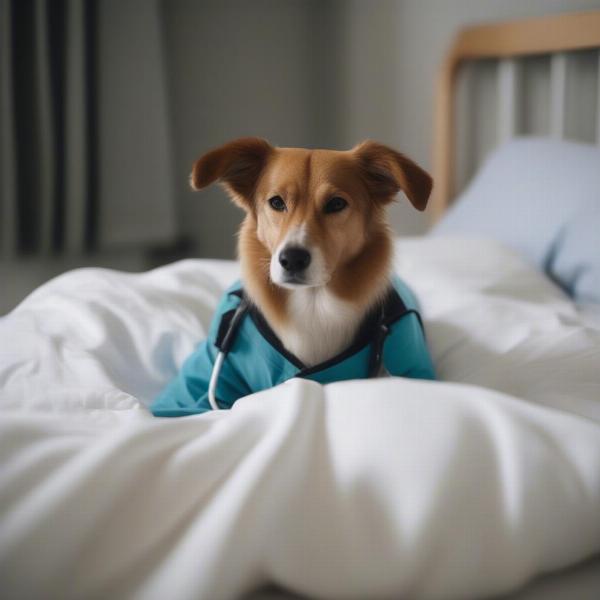A mass in your dog’s stomach can be a worrying discovery. While not all masses are cancerous, it’s crucial to understand the potential causes, symptoms, and treatment options to ensure your furry friend receives the best possible care. This article will guide you through everything you need to know about stomach masses in dogs, from diagnosis to recovery.
Understanding Stomach Masses in Dogs
Stomach masses, also known as gastric tumors, can be benign (non-cancerous) or malignant (cancerous). They can arise from various tissues within the stomach, including the lining, muscle layers, or connective tissues. Identifying the type and cause of the mass is vital for determining the appropriate course of action. Several factors can contribute to the development of stomach masses, including genetics, diet, and environmental exposures.
Common Symptoms of a Stomach Mass
The symptoms of a stomach mass in dogs can vary depending on the size, location, and type of mass. Some dogs may show no signs at all, especially in the early stages. However, as the mass grows, it can cause a range of issues. Common symptoms include vomiting, loss of appetite, weight loss, abdominal pain, lethargy, and changes in bowel movements. If you notice any of these signs, it’s essential to consult your veterinarian promptly.
Diagnosing a Stomach Mass
Diagnosing a stomach mass involves a thorough physical examination, blood tests, imaging studies (such as X-rays, ultrasound, or CT scans), and sometimes, a biopsy. The biopsy is crucial for determining whether the mass is benign or malignant. best soft food for older dogs Your veterinarian will discuss the best diagnostic approach for your dog based on their individual circumstances.
Treatment Options for Stomach Masses in Dogs
Treatment options for stomach masses vary depending on the type and stage of the mass. Surgical removal is often the preferred treatment for both benign and malignant tumors. Chemotherapy and radiation therapy may also be recommended, especially for cancerous masses. best soft dog food for older dogs Palliative care focuses on managing symptoms and improving the dog’s quality of life when a cure is not possible.
Recovery and Prognosis
The recovery period after stomach mass treatment depends on the type of treatment and the individual dog. Regular follow-up appointments with your veterinarian are essential to monitor for recurrence and manage any complications. good dry dog food for senior dogs The prognosis for dogs with stomach masses varies based on several factors, including the type of tumor, its stage, and the dog’s overall health.
 Dog recovering comfortably after stomach mass surgery
Dog recovering comfortably after stomach mass surgery
What if I find a lump on my dog’s stomach?
Any lump or bump on your dog’s stomach warrants a veterinary check-up. Don’t delay seeking professional advice, as early diagnosis can significantly improve the outcome.
Conclusion
A mass in your dog’s stomach can be a serious health concern. By being aware of the potential causes, symptoms, and treatment options, you can be better prepared to help your furry companion. Regular veterinary check-ups, a healthy diet, and a watchful eye can help detect potential issues early and ensure your dog receives the necessary care. Early diagnosis and treatment are key to the best possible outcome for your beloved pet.
FAQ
- What causes stomach masses in dogs? The exact causes are often unknown, but factors like genetics, diet, and environment can play a role.
- Are all stomach masses cancerous? No, some stomach masses are benign (non-cancerous).
- What are the signs of a stomach mass in a dog? Vomiting, appetite loss, weight loss, abdominal pain, and lethargy are common signs.
- How is a stomach mass diagnosed? Through physical exam, blood tests, imaging (X-rays, ultrasound, CT scans), and biopsy.
- What are the treatment options for a stomach mass? Surgery, chemotherapy, radiation therapy, and palliative care.
- What is the prognosis for a dog with a stomach mass? It varies depending on the type of mass, its stage, and the dog’s overall health.
- How can I prevent stomach masses in my dog? While not always preventable, a healthy diet and regular veterinary check-ups can help with early detection.
ILM Dog is a leading international online resource dedicated to providing dog owners worldwide with reliable and practical information on all aspects of dog care and wellbeing. From breed selection and puppy care to senior dog health and training, we offer expert guidance to help you navigate every stage of your dog’s life. We understand the diverse needs of dog owners from different cultures and experience levels, and we strive to provide valuable insights into dog health, nutrition, behavior, and more. Whether you’re a seasoned dog owner or just starting your journey, ILM Dog is here to support you. Contact us at [email protected] or +44 20-3965-8624 for expert advice. Visit ILM Dog for more helpful resources and information on dog care.